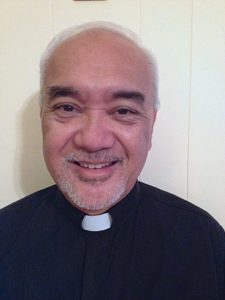… From Which All Partake
The Rev. John A.H. Tomoso †
Food is sustenance. Food is a necessity for life. There are many things about life here on Maui. We enjoy a life in which food, all kinds of food, from the many cultures and traditions we have, is grown, harvested and enjoyed. On any given day, our tables are laden with the bounty of our many farmers, ranchers and, to a growing extent, “backyard gardeners” who till an ever increasing amount of land. Why, just the other day, I read where Maui’s newest and biggest landowner, Mahi Pono LLC, is going to start a community farming program.
So, food is a daily reality and, if you’re like me, it is something with which we have a deep, abiding and intimate relationship. It cultivates (no pun intended) the familial and inter-personal relationships we have. During the course of my usual business day, I ask colleagues out to lunch, over which we discuss issues, problems and solutions. During lunch, we not only comment on what we’re eating but also who made the dish, what are the sources of the ingredients and without being noticed, look around to see what others are eating. It’s like the personal relationship of two colleagues having lunch is being nurtured by how others are relating to the food they are eating and the conversations they are having with it.
Food supplies what we need to go on living—living with not only what I’ll call the “palate of the plate” but also the “palate of the world around” with color, texture, light and shadow and dimension. The traditional Catholic Grace Before Meals (Bless us O Lord, and these thy gifts, which we are about to receive, from thy bounty, through Christ our Lord. Amen.) is a prayer of thanks that stems from these palates; what we see and derive from the life around us and the munificent generosity (of God and Man) of which we partake in. Usually, and probably out of how one is brought up, food supplies the ingredients for how we live and express appreciation and thanks. Think of it, don’t you appreciate being invited to a meal with family or friends and, once there, express your thanks. After the meal is over, we say “thanks” and sit back and think that life, all of it, is indeed good!
Beyond being a necessity, food, is a way for us to make sense out of life. Once, I was invited to a meal at a Vegan Ashram. From the moment I arrived, I knew it was going to be special. The table was invitingly colorful; sensually aromatic, fragrant and intricately laden with food; many colorful plates and dishes were on it. (I knew it took many folks many hours of preparation.) Before we ate, our hostess described each dish (no meat or animal products) and how each was made and even the origin of each dish. And then we all “gave thanks,” each in his/her own thought and language. The meal was a veritable feast for the body, mind, heart and soul. As we partook of this delicious repast, and with the conversations around the table, I began to think that what was before us, with the delicious food being thankfully eaten, was like a United Nations assembly, because I was eating with people from here and from all over the world. Oh, it was marvelous. We were all together around food! And then the thought came to me. What if instead of fighting wars, we would just have a meal, and the last one standing, would be the winner? Rather whimsical and knowingly far-fetched. Yet, the thought stayed with me throughout the meal and peppered my own conversation. Then another guest took the thought and regaled us about how he was a veteran of combat and how he really liked the idea of “eating and not fighting.” But then he said “Let’s get real,” it is through food and meals such as this one that all people will find “their source and their destination.” The room fell silent; each one perhaps inwardly digesting (again no pun intended) and trying to make sense of what was just said.
Kababayan, food sustains not only our bodies, but our souls. It is the bounty of God. It is a gift from those who farm; who till; who harvest. It is about the work, the hard work of many and the relationships we need to support whatever we do, whatever interests us. It is about the good earth, the ‘āina we live on and the relationship we have with it and the food that comes from it. It is about our relationship with each other; what we think, what we say, what we do. Food binds us together as a community and sustains how we relate to one another. Food is our “source and our destination.” Indeed, food is sustenance.
Mahalo ke Akua!

Rev. John A. Hau’oli Tomoso † is a Social Worker and Episcopal Priest. He is a Priest Associate at Good Shepherd Episcopal Church in Wailuku and an on-call Chaplain at Maui Memorial Medical Center. Tomoso was graduated from St. Anthony Jr./Sr. High School, the College of St. Thomas in St. Paul, Minnesota (Bachelor of Arts in Political Science and Sociology) and Myron B. Thompson School of Social Work at the University of Hawai’i at Mānoa (Masters of Social Work). In 2008, he retired from the civil service as the Maui County Executive on Aging. Tomoso is currently the Executive Director of the non-profit Tri-Isle Resource Conservation and Development Council, Inc. His wife Susan is a 7th grade Language Arts Teacher at Maui Waena Intermediate School.
